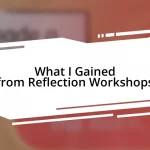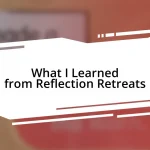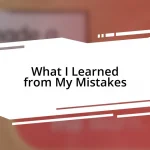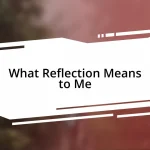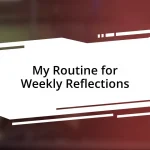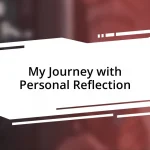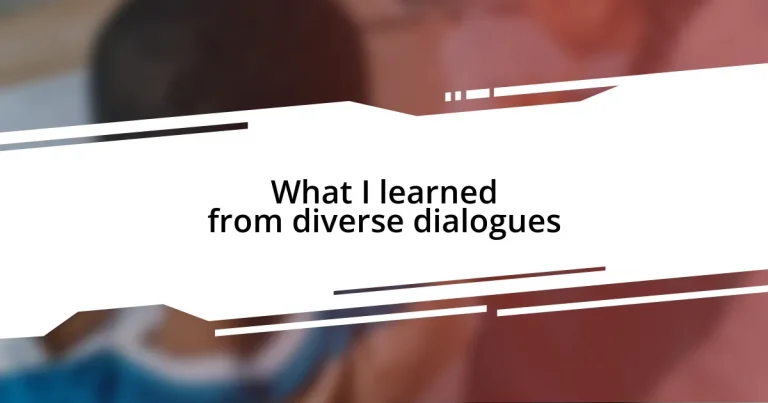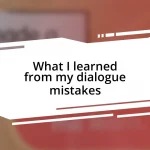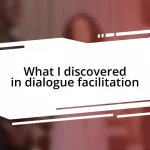Key takeaways:
- Engaging in diverse dialogues enhances empathy and understanding by exposing individuals to different perspectives and experiences.
- Key skills for effective dialogue include active listening, empathy, and open-mindedness, which facilitate deeper connections and growth.
- Creating inclusive environments involves encouraging participation from all voices, arranging physical spaces to promote openness, and recognizing cultural differences.
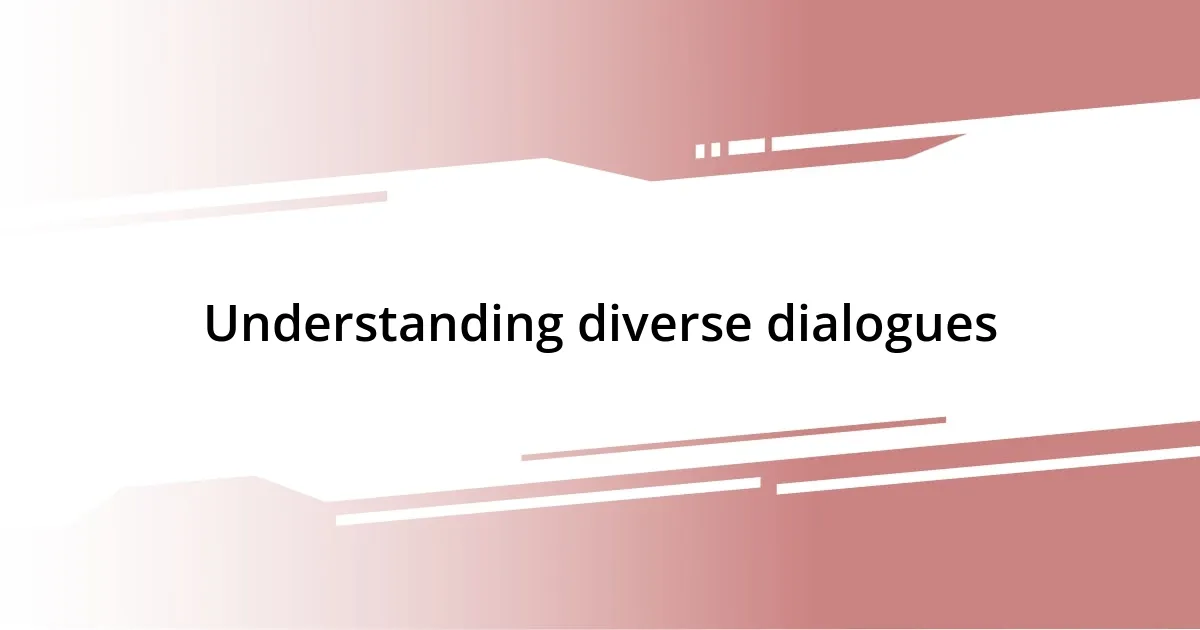
Understanding diverse dialogues
Engaging with diverse dialogues has taught me the profound impact of listening. I recall a conversation I had with a colleague from a different cultural background. As we exchanged stories about our traditions, I was struck by how our different experiences shaped our perspectives on life. Isn’t it fascinating how much we can learn just by being open and receptive to other viewpoints?
In my journey, I’ve realized that embracing diverse dialogues also means confronting uncomfortable truths. I once participated in a panel discussion where we tackled issues of privilege and inequality. The emotions in that room were palpable; I could feel my heart racing as I listened to stories of struggle. This made me question my own assumptions. How often do we pause to reflect on the experiences that differ from our own?
Moreover, I believe that understanding diverse dialogues enriches our empathy. I often think about the virtual workshop I attended, where participants from around the globe shared their challenges during the pandemic. Hearing how others faced isolation and uncertainty made my own struggles seem more relatable. It’s moments like these that remind me: how can we truly connect, if we don’t first understand each other’s narratives?
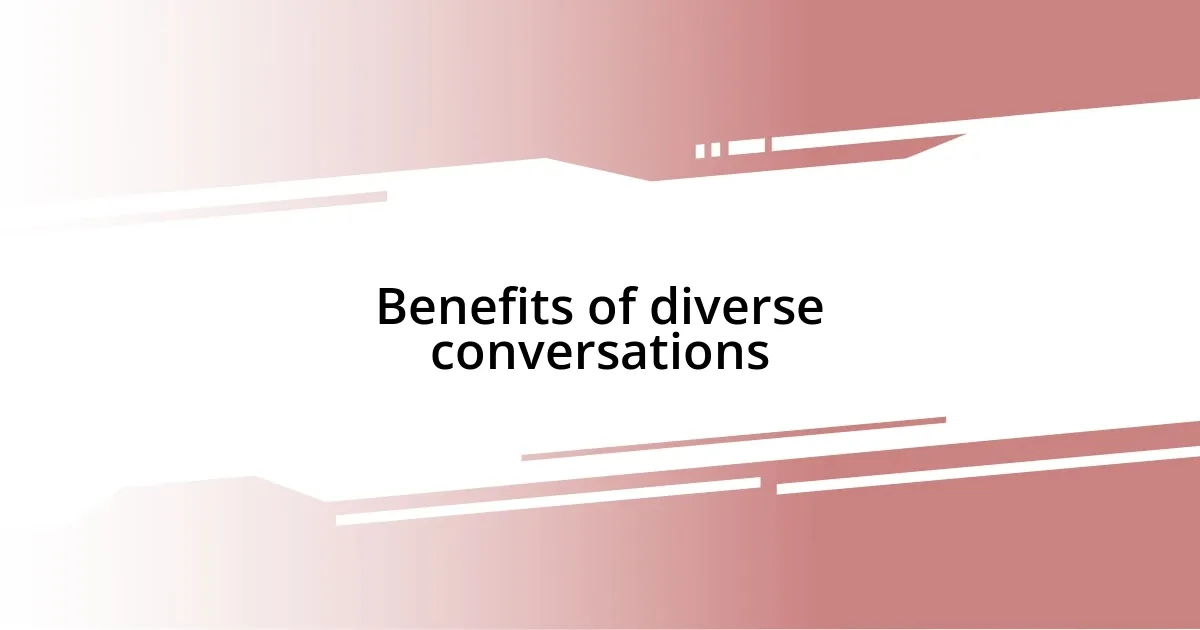
Benefits of diverse conversations
Engaging in diverse conversations has opened my eyes to the richness of human experience. I still remember a time when I joined a discussion group that focused on storytelling from various cultures. Each person shared pivotal moments from their lives, and I felt a sense of camaraderie grow despite our different backgrounds. It struck me how diversity not only brings varied narratives but also fosters a deeper sense of belonging among us.
The benefits of diverse conversations are numerous:
- Enhanced empathy: Hearing different perspectives allows us to understand and relate to others’ emotions on a profound level.
- Creative problem-solving: Diverse viewpoints can lead to innovative solutions that may not emerge from a homogenous group.
- Broader knowledge: Engaging with various opinions enriches our understanding of the world and informs our decision-making processes.
I cherish these conversations because they challenge my preconceived notions, push me to grow, and remind me of the vast tapestry we call humanity. Every interaction is an opportunity to broaden our horizons.
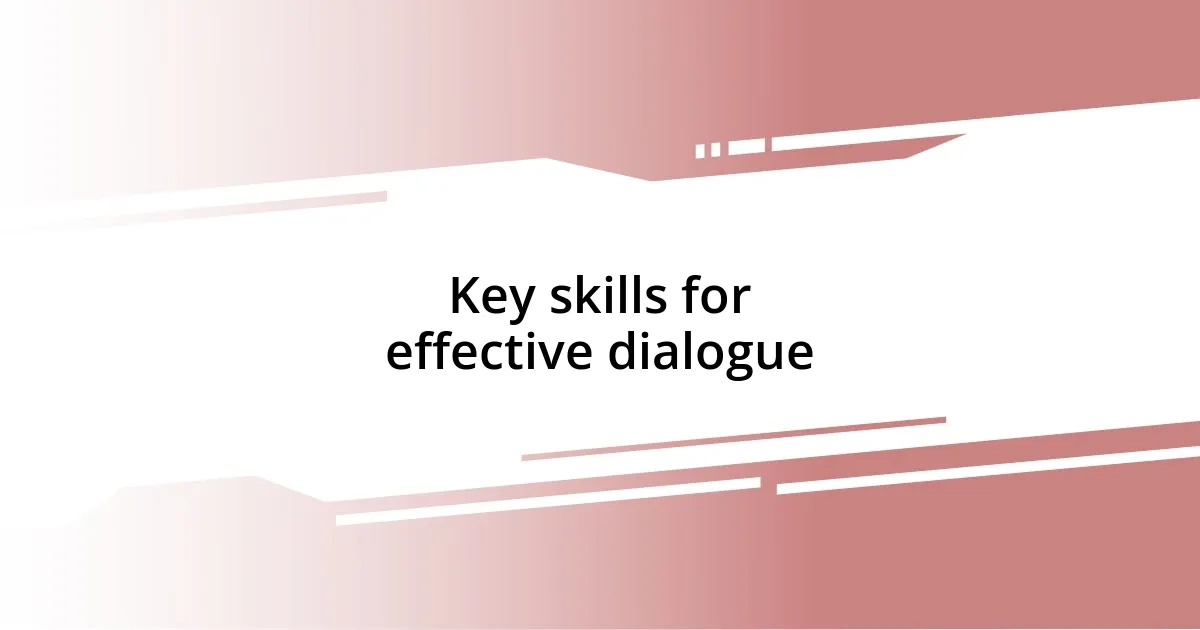
Key skills for effective dialogue
Engaging in effective dialogue requires a foundation of essential skills that facilitate understanding and connection. One such skill is active listening. I remember a delightful roundtable discussion where I practiced this. While I listened to a member discuss their artistic journey, I realized that listening deeply opened avenues for meaningful questions—questions that helped me connect their experiences to my own. Have you ever felt a conversation shift as you truly tuned into what the other person was saying?
Another key skill is empathy, which allows us to step into another person’s shoes. I had a moment during a mentorship session where I was guiding a young woman who shared her fears about entering the workforce. I offered insights from my own struggle to find a role that matched my passions, and I could see her visibly relax. At that moment, our bond strengthened. How often do we let our own experiences illuminate someone else’s path?
Finally, being open-minded is crucial. I attended a debate on climate change, where diverse opinions clashed passionately. Instead of getting defensive about my views, I chose to remain curious. I found that embracing different perspectives not only broadened my understanding but also challenged my beliefs in constructive ways. At what point do we allow ourselves to grow through dialogue rather than retreat into our comfort zones?
| Key Skill | Description |
|---|---|
| Active Listening | Tuning in fully to the speaker, asking follow-up questions, and showing genuine interest in their perspective. |
| Empathy | The ability to understand and share the feelings of another, fostering deeper connections and understanding. |
| Open-mindedness | Remaining receptive to ideas that differ from your own, which encourages growth and a broader perspective. |
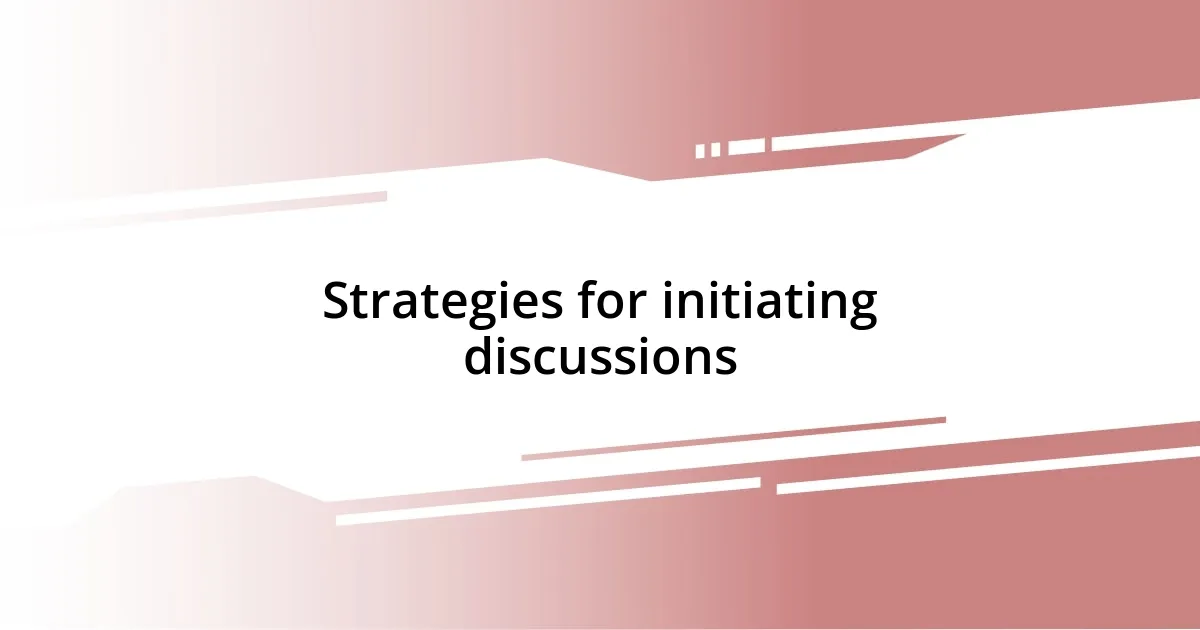
Strategies for initiating discussions
Initiating discussions can feel daunting, but starting with an open question often breaks the ice. I once walked into a networking event unsure of how to engage with strangers. Instead of diving into surface-level topics, I chose to ask, “What’s a unique experience that has shaped your view of the world?” The room buzzed with stories, and I was amazed at how quickly people opened up. Have you tried posing questions that genuinely invite others to share their thoughts?
Another effective strategy is to share a personal story related to the topic at hand. I recall attending a community forum about sustainability. When I mentioned my previous struggle with plastic waste in my own life, it not only set a relatable tone but sparked a vibrant conversation. Isn’t it interesting how our vulnerabilities can create a platform for collaboration and learning?
Finally, establishing common ground is a powerful way to kickstart a dialogue. I remember being in a mixed group of colleagues who had differing opinions on a project. By highlighting our shared goals, I helped the team see past our differences and focus on what we all wanted to achieve. How often do we underestimate the power of unity in facilitating meaningful conversations?
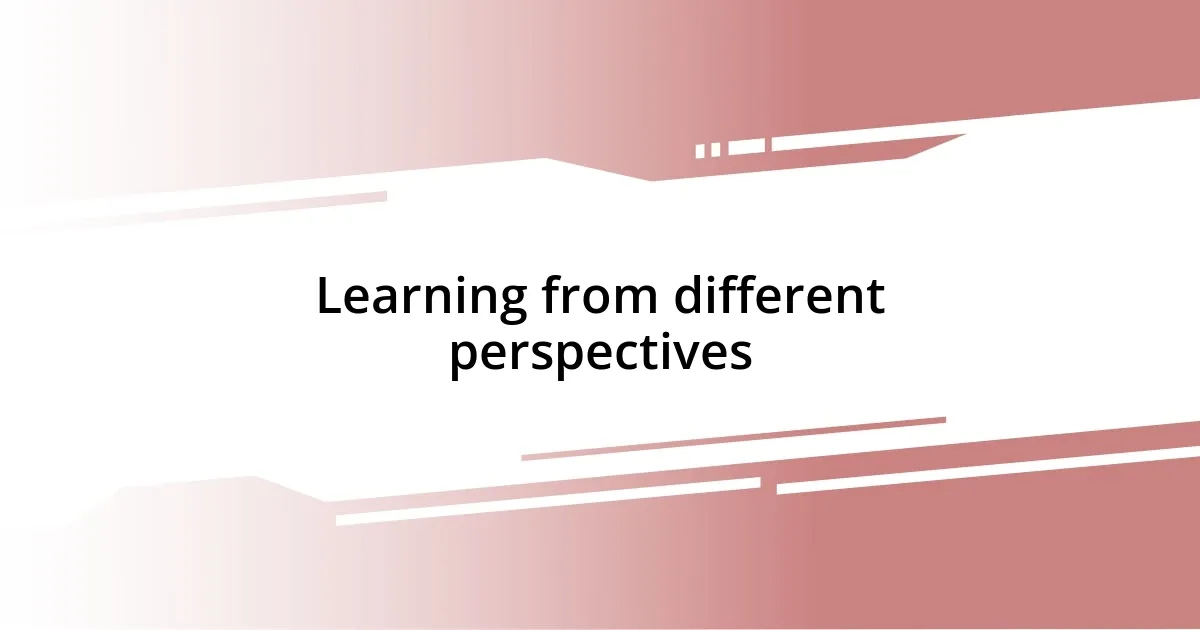
Learning from different perspectives
Engaging with diverse perspectives has profoundly enriched my understanding of the world around me. I recall a time when I participated in a cross-cultural workshop. Listening to individuals share their traditions and beliefs opened my eyes to the beauty and complexity of human experience. Have you ever found yourself surprised by insights that challenge your own preconceived notions?
In another instance, during a volunteer event, I worked alongside people from various backgrounds. Each story shared during our breaks added a new layer of appreciation for the differences that make us unique. One person told me about their journey as a refugee, and their resilience inspired me to rethink my own challenges. Isn’t it amazing how simply sharing our experiences can foster connections that transcend our differences?
Reflecting on these moments, I understand that learning from different perspectives is about more than just gathering information. It’s about building relationships and finding commonality in our humanity. I remember a lively discussion I had with a colleague from a different generation. Though we came from contrasting backgrounds, our shared passion for mentorship led to a revelation about the power of collaborative learning. Have you ever had your perspective shifted by someone who seemed so different from you?
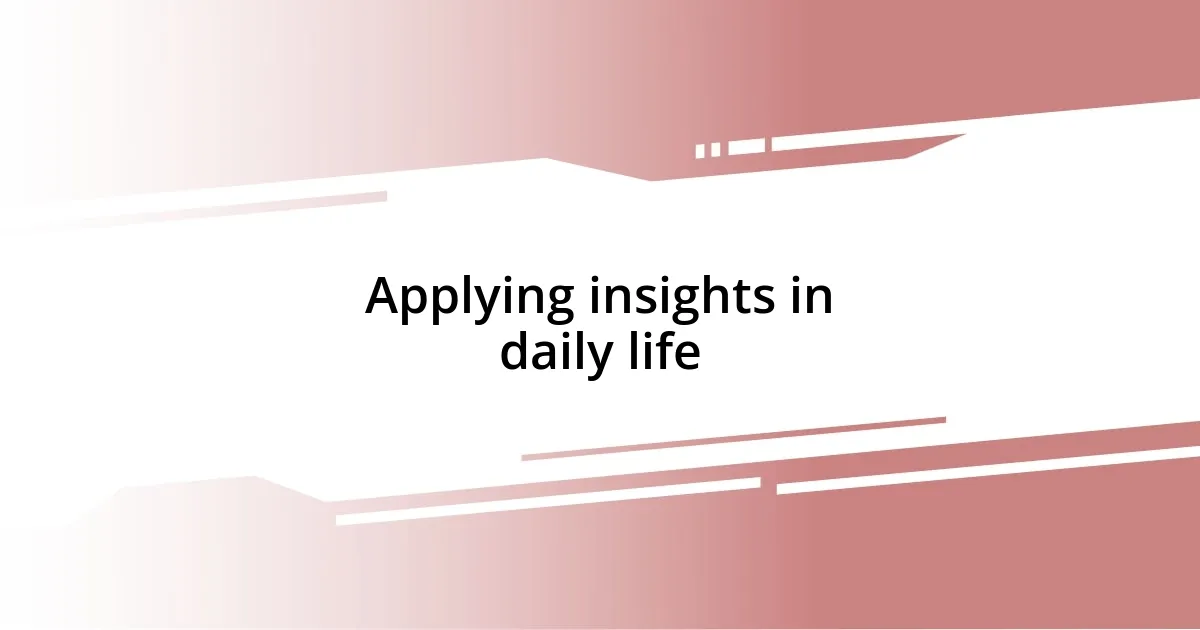
Applying insights in daily life
Applying insights from diverse dialogues into daily life can be a transformative experience. I remember when I began to consciously integrate active listening into my conversations. At first, I felt a bit awkward just absorbing what others were saying without immediately interjecting my thoughts. However, I quickly discovered that when I focused entirely on understanding their perspectives, the discussions deepened, and I often learned something surprising. Have you noticed how much richer a conversation becomes when we truly listen?
Incorporating the lessons I’ve learned has also made a noticeable impact on my relationships. Last month, I found myself in a heated debate with a friend over a social issue. Instead of insisting on my viewpoint, I paused and asked her how her experiences influenced her opinion. This shift not only diffused the tension but opened the door to a heartfelt dialogue where we both felt valued. Isn’t it fascinating how vulnerability and openness can transform potentially divisive moments into opportunities for connection?
Moreover, I strive to celebrate diversity in my community interactions. Participating in local events has become a passion of mine, and I always try to approach conversations with curiosity about others’ backgrounds. At a recent cultural fair, I made a point to ask vendors about their traditions, which often led to delightful exchanges. These moments of connection remind me that every individual has a unique story to tell. Why not make it a habit to celebrate these differences in your everyday encounters?
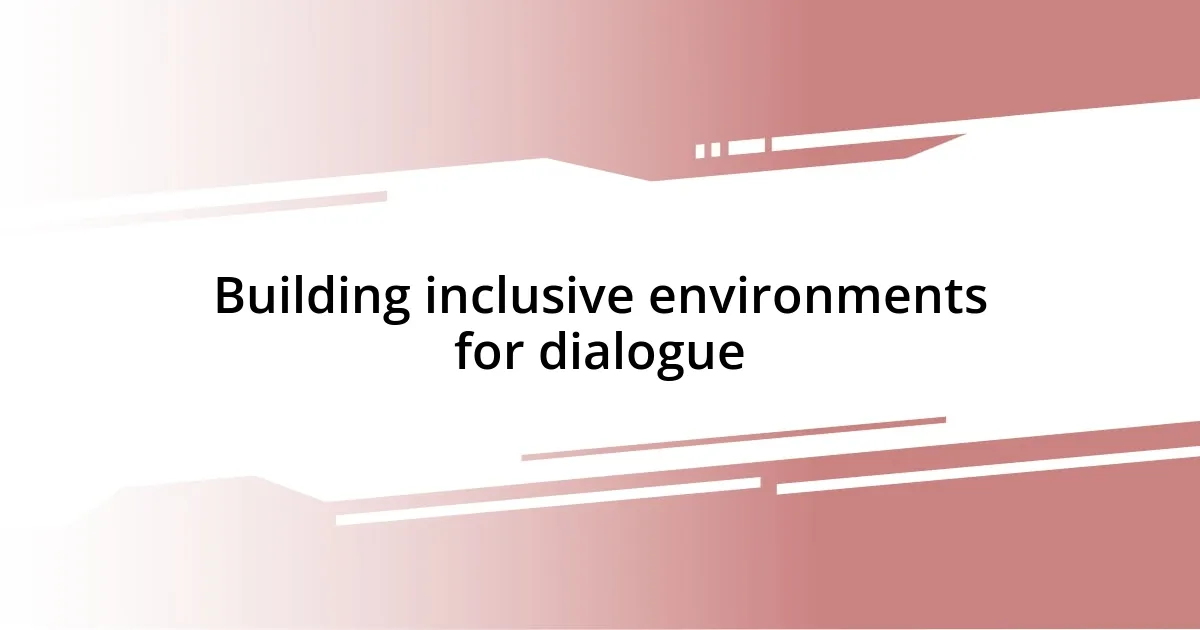
Building inclusive environments for dialogue
Creating inclusive environments for dialogue begins with fostering a sense of belonging. I remember a team meeting where I intentionally invited quieter colleagues to share their thoughts first. Surprisingly, this simple shift transformed the dynamic; rich conversations emerged, revealing diverse ideas I hadn’t anticipated. Have you ever noticed how giving everyone a voice can spark creativity and innovation?
I also find that physical space plays a crucial role in encouraging open dialogue. During a recent community gathering, we arranged chairs in a circle rather than in rows. This setup broke down barriers and fostered a relaxed atmosphere. Conversations flowed more naturally, and I felt an undeniable connection with those around me. Isn’t it interesting how the arrangement of our surroundings can influence our interactions?
To further cultivate inclusivity, I make it a point to continuously educate myself on cultural differences. I recall attending a workshop on unconscious bias, which opened my eyes to the microaggressions that can unknowingly occur in conversations. Since then, I’ve consciously checked my assumptions and approached discussions with a willingness to learn. How often do we take time to reflect on our biases before engaging in dialogue? I believe acknowledging our own perspectives enhances the richness of our exchanges.


